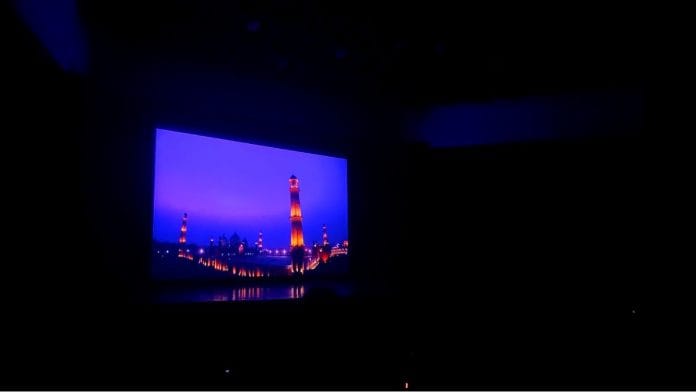Within decades of Prophet Muhammad’s death in 632 AD, Islam spread rapidly across the world—and with it, its distinctive architecture. The religion’s history can be traced through exquisite mosques built in Spain, Iran, Turkey and Mali, which emerged as important centres of worship.
British filmmaker of Pakistani origin, Faris Kermani, uses the seven great mosques to follow the journey of six pilgrims in his 2008 documentary, Seven Wonders of the Muslim World. The film was screened to a packed hall by the Foundation for Universal Responsibility of His Holiness The Dalai Lama (FURHHDL) on Wednesday at the India International Centre (IIC) in Delhi.
“Islam is a major religion of the world. This film looks at different historic mosques across the Islamic world,” said Anukriti Prasad, facilitator at FURHHDL. She called it an “intimate portrait of the young people who live and worship at these mosques.”
The visually stunning film traces the history and message of Islam by following the journey of six young pilgrims to Islam’s holiest city, Mecca. It explores their lives, beliefs and the beautiful and historic mosques where they pray while on their way to Saudi Arabia.
Kermani gives viewers a peek into the lives of these pilgrims—all from different parts of the world—while unveiling key moments in Islamic history.
FURHHDL, founded in November 1990, is a not-for-profit, non-sectarian, non-denominational organisation established with funds from the Nobel Peace Prize awarded to the Dalai Lama in 1989. This organisation aims to establish brotherhood and harmony through art and culture.
“Considering the political climate, harmony is important. We can’t work with an ‘us versus them’ frame. All of us are broadly working toward the same spiritual goal, and this film gives you that insight,” Prasad said.
Also read:
‘Not religious but spiritual’
The film does more than just explore the intricacies of the Muslim faith—it takes you on a breathtaking journey to Islam’s most revered and beautiful mosques: Al-Aqsa Mosque in Jerusalem, Alhambra Mosque in Spain, Blue Mosque in Istanbul, Great Mosque of Mali, Imam Mosque in Iran, Badshahi Mosque in Pakistan and the Grand Mosque in Mecca.
The architectural features of each mosque are of significance to Islam.
“This history of confluence goes hand in hand with the evolution of architecture,” wrote H. Masud Taj, an architect and award-winning adjunct professor at the Azrieli School of Architecture at Canada’s Carleton University.
The edifices were adapted to and assimilated with local styles and culture, resulting in a historically rich tapestry. “While inherently a spatial manifestation of Islam and its doctrines, engagement with several cultures over centuries has lent Muslim architecture a peculiar and prolific body of work, its monuments clustered along several cities across its civilisation,” Taj wrote.
Also read: Shahjahanabad to Old Delhi to Delhi 6 — How Indian Muslims lost the plot
An emotion filled journey
The six pilgrims are as much a part of the narrative as the mosques they visit. Kermani gives us an insight into their personal lives, as well as their economic, social and political status.
The youth are vocal and passionate ambassadors of Islam, and their journey is filled with emotion, especially as they reach their final destination – the Kaaba in Mecca.
“The film does not just talk about religion; it focuses on spirituality. Because the political atmosphere at present is very sensitive, it will be a bit difficult to talk openly about this film,” one audience member told ThePrint on condition of anonymity.
For many attendees, the film was not just a historical summary of Islam but a trip down memory lane.
“I went to Spain some time ago, where I visited the Alhambra Mosque. I have visited the places shown in the film. Seeing this film, I feel that I have just returned from the same tour. It has brought back many memories,” said Indian classical vocalist and audience member Madhumita Ray.
Also read:
Sensitive analysis of Muslim world
A graduate of the London Film School, Faris Kermani’s films analyse South Asian politics and the Muslim world. While he has made some drama series and fiction films, Kermani is known mainly for his documentaries. These include critically acclaimed works like Life of Muhammad, City of Martyrs, Karachi Cops and The Hidden Art of Islam, produced for leading TV networks such as BBC and Channel 4.
But the sensitive nature of his work means he is no stranger to controversy. Many Islamic nations opposed his 2011 BBC documentary, The Life of Mohammed—which harked back to the life of Prophet Muhammad and focused on the global impact of Islam—due to its “attempt to ruin Muslims’ sanctity.”
“What the enemy is trying to do in ruining the sanctity of Muslims certainly does more than allow us to react and, unfortunately, some Islamic countries are not taking this issue seriously. Condemnation of the West is one way of showing objection to this abominable act,” Iran’s then Minister of Culture, Mohammad Hosseini, had said of the film in 2011.
On the other hand, Seven Wonders of the Muslim World is about peace and religious harmony.
“I didn’t know much about Islam. The film throws light on many aspects beautifully,” said Anita Bhagat, a software developer, as she exited the hall.
(Edited by Zoya Bhatti)






